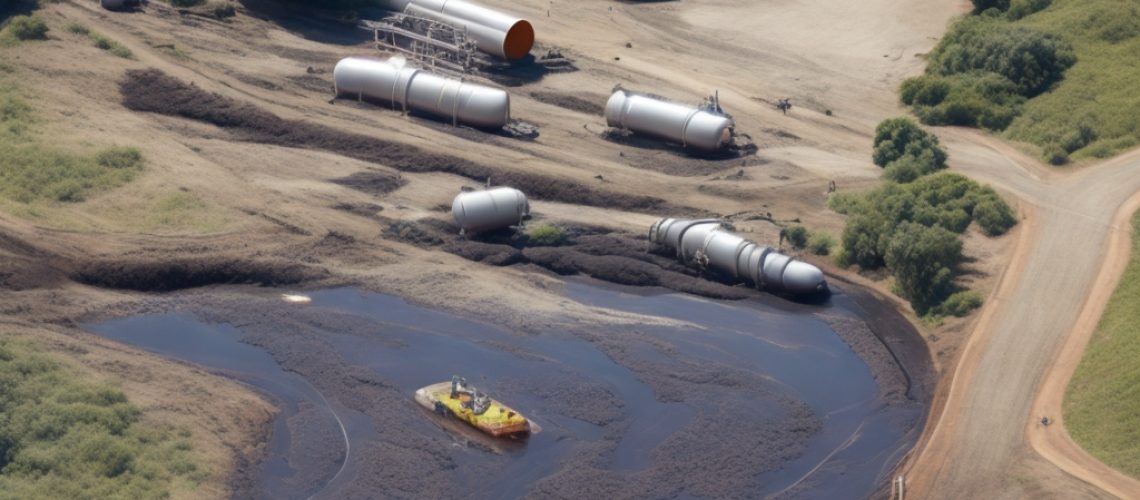The Trafigura scandal in Ivory Coast emerged as one of the most significant environmental and human rights disasters in the early 2000s. Global commodity trading company, Trafigura, became embroiled in controversy when it was discovered that they had dumped toxic waste in the city of Abidjan, resulting in widespread illness and death among local residents. This event not only raised questions about the company’s ethical practices but also highlighted the broader issue of inadequate waste disposal regulations in developing countries.
In August 2006, Trafigura chartered a ship named the Probo Koala to dispose of large quantities of toxic waste. The waste was primarily composed of hazardous materials such as hydrogen sulfide and sodium hydroxide, which are known to be extremely harmful to both the environment and human health. Upon arrival in Abidjan, the waste was dumped in various locations— including open-air landfills and drainage ditches— across the city, leading to severe health consequences for the local population.
As news of the disaster spread, multiple investigations revealed a shocking level of negligence on the part of Trafigura, as well as local authorities who had failed to properly oversee the disposal process. These revelations sparked international outcry and compelled both the Ivorian government and Trafigura to take responsibility, ultimately leading to legal actions and financial settlements for the victims. While a resolution seemed to be reached, the Trafigura scandal continues to serve as a cautionary tale on the potential consequences of improper waste disposal and corporate irresponsibility.
Trafigura Scandal Overview
Probo Koala Incident
In August 2006, a ship named Probo Koala piqued global attention after it chartered by the Swiss-based multinational Trafigura to transport a hazardous waste cargo. During the ship’s stop in Amsterdam, Trafigura attempted to dispose of the waste, which consisted mainly of a toxic mix of caustic soda, hydrogen sulfide, and mercaptans. But due to a disagreement on the disposal cost, the waste was returned to Probo Koala, and the ship continued to Abidjan, Ivory Coast.
Upon arrival at Abidjan, Trafigura contracted a local company, Compagnie Tommy, to dispose of the waste, which was illegally dumped at various sites around the city. This action led to a considerable environmental and health crisis.
Contamination Effects
The dumping of hazardous waste in Abidjan resulted in significant contamination of the air, soil, and water sources. Over 100,000 people sought medical assistance, reporting symptoms like respiratory problems, skin irritations, and abdominal pain. Tragically, the contamination had severe consequences, causing at least 17 deaths and affecting countless lives by the toxic waste exposure.
Several investigations, including those conducted by the United Nations and the Ivorian government, found Trafigura responsible for breaching international waste disposal regulations. The scandal brought to light the need for stricter enforcement of hazardous waste disposal and international cooperation in environmental protection. As a consequence, Trafigura faced legal action from various parties globally, leading to substantial financial settlements and ongoing corporate reputational damage.
Ivory Coast Government Involvement
Environmental Impact
In 2006, the Ivory Coast government became embroiled in the Trafigura scandal when toxic waste from a Trafigura ship was dumped at multiple sites around Abidjan, the country’s economic capital. This illegal dumping led to significant environmental and health consequences, affecting up to 100,000 people. The government’s lax oversight and lack of proper waste disposal regulations allowed the hazardous waste to seep into the local ecosystem, contaminating soil and water supplies.
Legal Actions
The Ivory Coast government’s involvement in the Trafigura scandal led to numerous legal actions, both within the country and internationally. After public pressure, the government terminated its contract with the waste disposal company, Compagnie Tommy, which was responsible for the dumping. Additionally, several high-ranking officials faced criminal charges and ongoing investigations in the subsequent years.
In an effort to seek reparations, the Ivory Coast government initially sought $198 million from Trafigura. Following extensive negotiations, the two parties agreed to a settlement of $198 million in 2007, which was intended to cover:
- Medical support for affected individuals
- Cleansing and rehabilitation of the contaminated areas
- Strengthening of environmental regulations and waste disposal systems
Despite the substantial settlement, many human rights, and environmental activists have criticized the result, arguing that the compensation is insufficient considering the severe health and environmental consequences of the hazardous waste dumping.
Trafigura’s Response and Compensation
Corporate Accountability
In response to the scandal, Trafigura recognized the severity of the situation and demonstrated corporate accountability. They conducted an internal investigation to identify the factors that led to the incident and took steps to ensure such events do not occur in the future.
Settlements
Trafigura reached settlements with the affected parties and the Ivorian government to compensate for the damages caused by the toxic waste dumping. In 2007, they paid $198 million to the Ivory Coast government and, in 2009, agreed to a $45 million settlement with the 31,000 affected individuals. These settlements were instrumental in resolving the matter and alleviating some of the suffering caused.

